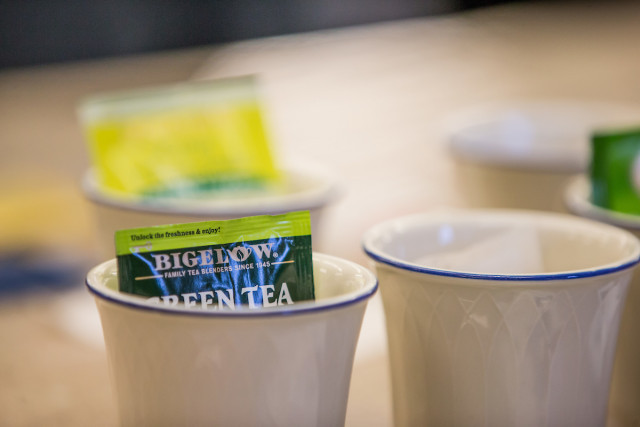It’s one thing for a company to say that they are devoted to sustainability—and quite another for them to deliver. Bigelow Tea does both.
The company has gone green when it comes to packaging, which is totally recyclable from the box to the individually wrapped bags to the string; lighting (the headquarters hosts nearly 900 solar panels); and waste, saving 95 percent of landfill-destined product through smart composting and donation efforts.
Why did Bigelow Tea decide to champion environmentally conscious practices?
It’s elementary (literally).
“It all started with my kids”, CEO and president Cindi Bigelow stated in a recent Visiting Industry Professional (VIP) discussion at the Johnson & Wales University Providence campus. “They came home from elementary school one day showing me some recycled crafts they had made in class and were talking about sustainability and how each person can help the environment.”
Steeped in Tradition—but Ready for Change
From then on, she was determined to make a difference. She looked into the products and packaging that Bigelow Tea offered and saw that there was room for improvement. The company was founded in 1945 by Ruth Campbell Bigelow, Cindi’s grandmother, and, today, boxes of Bigelow tea can be found on supermarket shelves nationwide. The third-generation leader understood the company’s power and following and knew that she had to at least try to create a more sustainable organization.
First, Bigelow created a sustainability team to focus on creative ways to help the environment through their passion for tea. “There was so much energy and passion within the sustainability team,” Bigelow said. And with that energy and passion came amazing ideas, including 100-percent recyclable boxes and a “Zero Waste to Landfill” commitment.
But the team didn’t stop at conservation and recycling—the ideas and tactics that they designed extended outside the business and into the community with a garden full of spices and vegetables grown for the Bridgeport Rescue Mission, helping to feed those in the area that were less fortunate.
Brewing Corporate Social Responsibility
Bigelow Tea’s focus on their environmental impact and developing a connection to their customers that have a passion for sustainability is actually part of a larger trend towards corporate social responsibility or CSR.
Millennials are major consumers, and, according to a 2010 Pew Research Study, the generation ranks helping others in importance just behind having a strong family and marriage. This way of thinking and caring has forced businesses and corporations to reconsider their actions and how they treat the greater world around them.
Suddenly, creating a product that consumers want is simply not enough.
CSR initiatives allow businesses to connect to consumers on a more personal level, as they spend time combating social and/or economic issues that both are passionate about.
“Do the right thing, and good things will follow”, Cindi said. She lives by this quote and encourages her company to do the same.
If you have questions about how JWU Online can help you achieve your academic goals, call 855-JWU-1881 or email [email protected]. You can also complete the “Request Info” form on this page.
